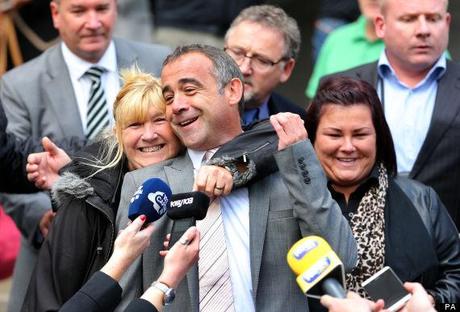 Jimmy Savile is, of course, the current focal point of this hype. Yet Savile is actually a defendant unable to defend himself (he died in 2011, a year before allegations against him became public). In cases of sexual abuse often the verdict is made based on one side's series of events versus the other. But in this instance the Savile cannot tell us his side of the story, there is no one to conclusively prove or refute the claims of those who have come forward.
Jimmy Savile is, of course, the current focal point of this hype. Yet Savile is actually a defendant unable to defend himself (he died in 2011, a year before allegations against him became public). In cases of sexual abuse often the verdict is made based on one side's series of events versus the other. But in this instance the Savile cannot tell us his side of the story, there is no one to conclusively prove or refute the claims of those who have come forward.This leads the cynic in me to wonder whether there is an element of fame-hunting (or event compensation-seeking) in those who have stepped forward with their stories. If there really were 'hundreds' of victims, then why has it taken so many years for anyone to bring their allegations to the public attention?
"The wave of allegations made against him sparked the launch of the Operation Yewtree police investigation, which is also looking into claims about others linked to him as well as separate allegations about a number of high-profile figures." The Guardian Website, 14/10/2013
The key here, for me, is that not only has Jimmy Savile not yet been found guilty of any of these allegations but also that numerous other public figures have been brought into the limelight for all the wrong reasons as well. Take, for example, the case of Coronation Street actor Michael Le Vell who was arrested and taken to court for raping a child, this heinous crime turned the nation against him- he was suspended without pay from his job, he was ridiculed and insulted and everyone was sure he was guilty because he was in court and every day he was shamed on the news with his head hung low. Yet he was cleared. All allegations said to be false and where do the public stand then? In support of the man they briefly shunned from society.
 Is it fair then to publicise the names of those who are accused of sexual crimes or, for that matter, any crime? When Googled Michael Le Vell's name is synonymous with sexual abuse, child abuse and his trial. This will forever taint an innocent man, let alone the opinions of his family and friends. Some suggest that by publishing names of celebrities said to be abusers encourages more victims to come forward, but this refers to my original point- do those who seek the publicity of a celebrity trial only have the interest of justice in their mind? Please do remember that this is the opinion of a cynic and of course there are many genuine claims out there that need to be heard. Perhaps the publicity of celebrity scandals do encourage young people to speak out in the same manner that celebrities influence young people in other aspects of their lives.
Is it fair then to publicise the names of those who are accused of sexual crimes or, for that matter, any crime? When Googled Michael Le Vell's name is synonymous with sexual abuse, child abuse and his trial. This will forever taint an innocent man, let alone the opinions of his family and friends. Some suggest that by publishing names of celebrities said to be abusers encourages more victims to come forward, but this refers to my original point- do those who seek the publicity of a celebrity trial only have the interest of justice in their mind? Please do remember that this is the opinion of a cynic and of course there are many genuine claims out there that need to be heard. Perhaps the publicity of celebrity scandals do encourage young people to speak out in the same manner that celebrities influence young people in other aspects of their lives.In my opinion it is not freedom of speech for the press to publish the names of individuals when it may harm their own right to a private life. To me, it is clear that part of punishment for a crime should be the public knowledge of the guilty perpetrator (which leads on to all sorts of rants regarding super injunctions or 'gagging orders' protecting the guilty from shame) but part of the trial should not be compromised by the public knowledge of a defendant. Is it a fair trial if his jury are bombarded with propaganda in the tabloids and outcry in the streets? Should an innocent man's reputation be forever blighted because of one person's word against another?

